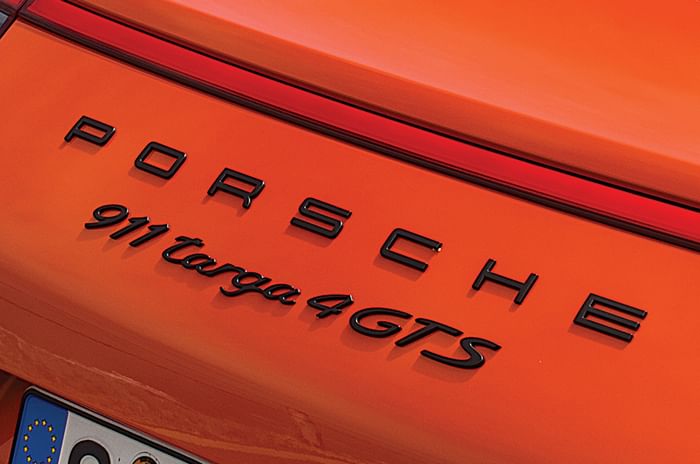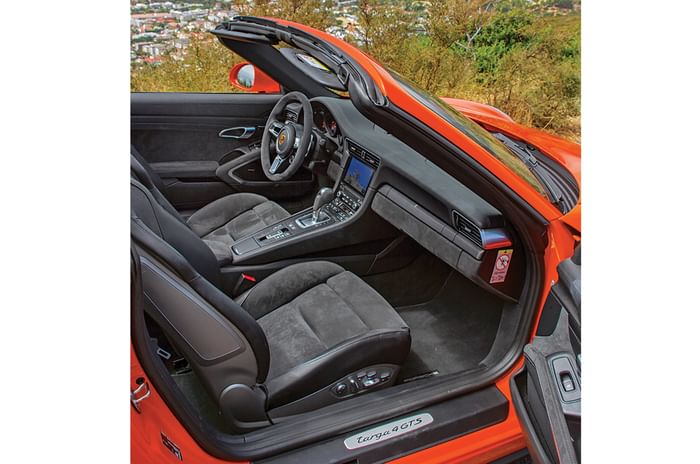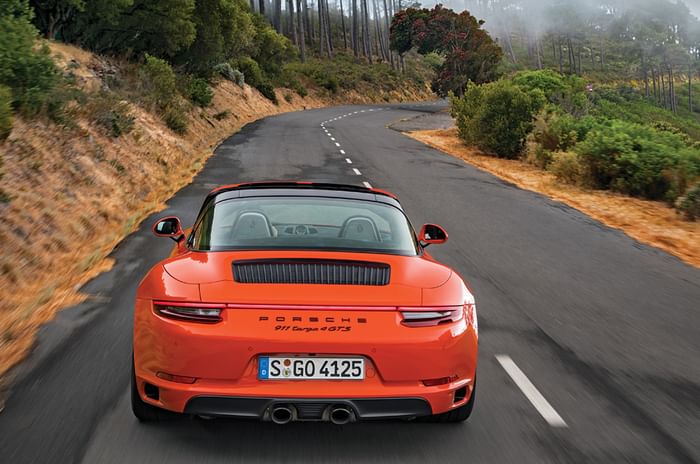2017 Porsche 911 Targa 4 GTS review, test drive
The Porsche 911 gets the GTS treatment enhancing its appeal. We drive the latest Targa iteration of one of the most versatile sportscars in the world.
Published on Sep 27, 2017 06:00:00 AM
23,356 Views
Follow us on


Alcantara suede finish marks out GTS interiors from standard 911s.

Stiffer suspension hasn’t hurt ride quality and the GTS is decently pliant on uneven surfaces.
No other sportscar is as race-bred and loves to be driven as hard as Porsche’s iconic 911 which, over the better part of a half century, has been finely honed with experience gained from racing around the globe. Hence, a test drive of any Porsche 911 can never truly be complete without a couple of laps around a racetrack. It’s like going to Agra and not seeing the Taj Mahal.
It was in order then to set the navigation system to Killarney Raceway, 30km away from the Vineyard Hotel in Cape Town, the base for the media drive of the latest Porsche 911 GTS.
GTS stands for ‘Grand Touring Sport’, which, in Porsche-speak, combines long-distance comfort with a shot of sportiness. This slots the GTS models between the regular Carrera, and the more track-focused and hard-core GT3. So is that the sweet spot in the Carrera range?
| Porsche 911 Price, Mileage, Specifications, Features and Variants | |
|---|---|
| Brand | Porsche |
| Model Name | 911 |
| Porsche 911 Price | ₹ 2.44 - 3.27 crore |
| Porsche 911 Range/Mileage | Petrol Hybrid : 9.34kpl | Petrol : 9.62kpl |
| Porsche 911 Specifications | Coupe/Convertible | 2 doors | 2 seats View All Specs |
| Porsche 911 Features | LED headlight | 10.9-inch Touchscreen display | 6 airbags View All Features |
| Porsche 911 Variants | Carrera | Carrera 4 GTS View All Variants |
With the GTS spec offered in every possible variant, you would think so. You can order the GTS in Coupe, Cabriolet or Targa body styles, with the option of a manual or automatic (PDK) transmission, and either two- or four-wheel drive. Porsche has covered it all.
What is common to all GTS variants is the wider body (shared with the Carrera 4 and Turbo) and a beefed-up version of the twin-turbo, 3.0-litre flat-six engine which now develops 450hp – 30hp more than the standard (991.2) Carrera S. Other GTS enhancements include 20-inch centre-locking wheels, a lowered sports suspension, sports exhaust, a limited slip differential, torque vectoring, active engine mounts (which firm up during cornering) and the option of active rear steering.
The insides stand out with the Alcantara finish on the steering wheel, seats and gear lever, which looks and feels great. The cabin abounds with GTS badges and in keeping with its purposeful character, dark bits are used. The wheels, exhaust and badges are all black and the tail-lights have a smoked effect.
The drive to Killarney was during peak rush-hour traffic in Cape Town – a good way to introduce myself to the 911 GTS. For this short drive, I had the Cabriolet version with the PDK gearbox and Deesch Papke, Porsche’s CEO for the Middle East and Africa, for company. A good natter on all things Porsche and the ease with which the GTS inched through traffic, the hour-long journey went by pleasantly. Though the sporty quotient has been ratcheted up, the suspension, even on ultra low-pro tyres, felt pliant enough for daily use. The PDK transmission (in Normal mode) was impressively slick and except for the clutch, which engaged a bit sharply, moving off from a standstill, it slurred through ratios like in a docile family car. It’s good to know that, even in GTS guise, the 911 Carrera is a very usable, everyday car, but that’s not what it was created for. The Killarney Raceway is more the 911 Carerra’s natural habitat and over six very hot laps I would get to know this new GTS version very intimately.
For my stint on the track, I find myself behind the wheel of a Carrera 4 GTS Coupe, with a manual gearbox. I’ve driven this seven-speed ZF unit before and, while it imparts a deeply satisfying sense of mechanical purity every time you snick the stubby lever and nicely sprung lever through the ‘box’s narrow gate, it actually slowed me down on the tight Killarney circuit where I needed to have both hands on the suede-covered wheel.
First corner, first lap, the dynamic brilliance of the 911 GTS instantly shines through. The electrically assisted steering is so accurate, so well-weighted that it lets even a novice driver place the car anywhere on the circuit with millimetric precision. Aided by an active rear axle, which pivots the GTS around its fat haunches, it feels great to nail every apex spot on. The Pirelli P Zero Corsa UHP tyres are especially developed for track work and come with astonishing reserves of grip to cement the GTS to the track. The front goes momentarily light when you stomp your right foot down because of the weight transfer to the rear under hard acceleration. It’s a 911 handling characteristic that hasn’t changed in years; but it’s something you get used to and even use to your advantage by diving deeper and faster into corners.
You also learn that this is not a car that rewards aggressive driving but prefers precise steering and throttle inputs.
The long straights are perfect for wringing out each of the 450 horses out of the twin-turbo flat-six which has a spine-tingling exhaust note all the way to the redline. There’s hardly any turbo lag at all, and it’s only when powering out of the slow hairpin at the end of the back straight that I felt a hint of hesitation. The performance of the GTS is staggering in all respects. Down the back straight, I was nudging 240kph, but could have pushed even harder had I reposed more faith in the brakes that are equally stupendous at shedding speed. After those six hard laps I was left wishing I had more talent to dig deep into its dynamic capabilities because the truth is that the 911 rewards the pro driver more than any other sportscar.
The next day I picked up yet another body style – a Targa 4 GTS with a PDK unit and drove to Signal Hill on the outskirts of Cape Town. The road ends in a car park with a spectacular view of the Indian and Atlantic oceans, but that wasn’t what I was interested in. The last 4km of the undulating road had some nice corners and almost no traffic, which allowed for short bursts of speed.
All GTS models get the Sports Chrono Package as standard and four drive modes (including a customisable one) that can be selected via a dial on the steering wheel. The Sport Response mode gives an extra dose of power for around 20 seconds. It’s not that you’ll ever need this ‘push-to-pass’ mode (unless you meet another GTS owner you want to drag with) but it’s fun to play with all the same.
The sun is out and it’s a great day to fold the Targa roof away. The exhaust note sounds crisp in the cool air and the sense of speed is heightened with tall trees flashing past my head. The road is a bit bumpy and the light nose bobs up and down in typical 911 fashion, but even in the firmest of suspension settings, the ride doesn’t feel unduly harsh.
The quick steering and sharp turn-in makes the GTS a joy on any twisty road. You can get on the power quite early, before the apex and the rear-engine Porsche simply squats on its fat haunches, digging those 305/30 ZR20 boots into the tarmac. The thing is that the GTS always feels like a rear-engined car – not any rear-engine car, but a 911. And it’s these very dynamic idiosyncrasies that endear it to its owners.
There are no immediate plans to launch the GTS variant in India, which will no doubt be considerably more expensive than the standard 911. This begs the question: Does it make sense for us? The truth is, Indian roads and traffic simply won’t allow for the GTS to be enjoyed to its fullest potential here, but it’s still a hugely compelling package. An incredibly driver-focused car, it feels at home just about anywhere. It will hammer round the Buddh circuit without any warning lamps lighting up, and then trundle home through Delhi’s traffic gridlock. It’s a great long-distance cruiser and sounds absolutely brilliant too. It’s a sportscar with a huge sense of occasion for every occasion.
Tech Specs 
Copyright (c) Autocar India. All rights reserved.










 Engine
Engine Transmission
Transmission Acceleration
Acceleration Body
Body Dimensions
Dimensions
Comments
Member Login
Personal Details
No comments yet. Be the first to comment.